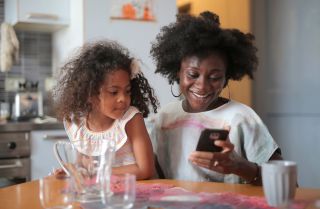Child Development
Screen Time Isn't Bad for Kids, if It's Shared With Parents
Ask, how is this activity affecting this child?
Posted December 8, 2023 Reviewed by Devon Frye
Key points
- New research finds a positive link between literacy skills and family screen time.
- Overall, relationships between screen time and kids' health outcomes are small.
- Excessive social media use, especially for teens, may be associated with depression.
- Focus on conversations about what kids are watching, not the number of hours they spend on screens.

If you’ve ever groaned at the prospect of watching yet another episode of "Pokemon" or "Daniel Tiger," take heart. As one study found, this way of watching screens “together” may be associated with kids having stronger reading and writing skills. Specifically, a recent "study of studies," published in November 2023 by Australian researcher Taren Sanders and colleagues, found a positive link between kids' literacy skills and their time watching screens with their families.
All screen time isn't created equal. The important piece is the relationships kids are or aren’t having while watching screens—and whether they're using social media.
It's Not a Doomsday Scenario
Let's get deeper into the research. Sanders and colleagues reviewed over a hundred studies, including 1.9 million kids and teenagers, and found that, overall, there was only a small link between screentime and a number of outcomes, including literacy and health. That suggests that there's no "doomsday scenario" that some like to think and that some media reports suggest.
Next, the researchers looked at a finer-grained level at the types of activities kids were engaging in, with parents or alone. They found, interestingly, that there was a negative link between kids watching screens and their reading and writing skills overall. Yet, when they studied parents watching screens together with kids, they found a positive link between screen time and literacy. That means that taking the time to watch screens with kids could be a good thing.
Focus on Relationships, Not Only on Screens
Why does this matter? It's probably less about the screen time itself, and more about the conversations that ensue.
Parents, even if they're only sometimes looking at the screens, are likelier to ask questions like, "What did you like about that show?" or "Why was that character funny?" than parents who don't watch at all. They also have the chance to check on what sense kids are making of what they're watching. Are they scared of the ghosts in a show, for example? Or do they think it's hilarious? And what stories might they imagine, using the characters they see on screen?
Watch Out for Excessive Social Media Use
On the other hand, the researchers found a clear but small negative link between social media use and depression. This is also important, especially since it aligns with much research and discussion recently on the teen mental health crisis and social media. As the Surgeon General Dr. Vivek Murthy said in May 2023, "At this point, we do not have enough evidence to say with confidence that social media is sufficiently safe for our kids."
Murthy points to research showing that up to 95 percent of U.S. teens are using social media. Another study found that teens who used it more than three hours a day faced double the rates of depression and anxiety as those who used it less. We should be worried about these patterns and be especially cautious when noticing older kids who isolate themselves and overdo social media.
What else should we take away from this research? Especially once kids are in elementary school, we likely don't need to suggest that any amount of screen time is a "no." Younger kids, especially two and a half and younger, can have trouble distinguishing reality from fiction on the screen. Screen time for them is more likely to be problematic—especially if it takes away from the critical interactions they need with real-life people.
This should be helpful for parents and educators wondering "How much screen time should I let kids have?" The real question, it seems, is how much interaction and talking kids are doing when they're looking at screens. It's not so much a question of the number of hours as the type of activity—and especially the interactivity.
Ask: How Is This Activity Affecting This Child?
As a speech pathologist who has worked with kids from toddler through high school age kids—as well as a mother of two—I'm often asked for advice about what to do in terms of screen time. "Should I just ban screens, or set a firm time limit?" parents often ask.
Sometimes, once I start talking with parents, I see that the situation is a lot more nuanced. There's talking on video chat or Zoom versus playing Roblox with friends, versus making videos to put on TikTok—versus simply scrolling. It's important to keep in mind that all of these happen on the screen. But they're actually different activities—and affect kids in different ways.
The real question should be not "How much screen time is my child having?" but questions like: "What is my child doing on the screen?" "What relationships and conversations is he or she having as a result?" and "How aware is my child of the ways screen time affects them?"
This second piece is one where our conversations can play an important role. We can help kids notice, for instance, whether they feel agitated after watching a certain video game, or excited after seeing a YouTube video. We can also help them see what happens after the fact. Are they sharing new ideas or funny memes, or are they comparing themselves negatively to others? Are they using social media in ways that leave them feeling “not good enough”?
The more we learn about screen time, the more we start realizing it’s not really about screen time, but about the talking that happens during and after screen use.
Next time you’re with the kids in your life, keep that in mind. Use the technology to jumpstart conversations. Ask open-ended questions. See what your kids are using the screens for. Help them use screens in more active ways.
And, for teens especially, encourage cutting down on social media if they're using it a lot. Help them see which apps and interactions are most important to them, and focus only on those. You’ll be helping them with their self-awareness and mental health.
Facebook image: Kaspars Grinvalds/Shutterstock
LinkedIn image: shisu_ka/Shutterstock




